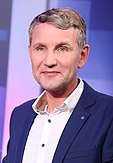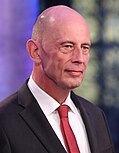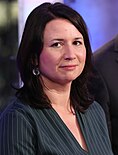| |||||||||||||||||||||||||||||||||||||||||||||||||||||||||||||||||||||||||||||||||||||||
All 90 seats of the Landtag of Thuringia 46 seats needed for a majority | |||||||||||||||||||||||||||||||||||||||||||||||||||||||||||||||||||||||||||||||||||||||
|---|---|---|---|---|---|---|---|---|---|---|---|---|---|---|---|---|---|---|---|---|---|---|---|---|---|---|---|---|---|---|---|---|---|---|---|---|---|---|---|---|---|---|---|---|---|---|---|---|---|---|---|---|---|---|---|---|---|---|---|---|---|---|---|---|---|---|---|---|---|---|---|---|---|---|---|---|---|---|---|---|---|---|---|---|---|---|---|
| Registered | 1,729,242 | ||||||||||||||||||||||||||||||||||||||||||||||||||||||||||||||||||||||||||||||||||||||
| Turnout | 1,121,814 (64.9%) | ||||||||||||||||||||||||||||||||||||||||||||||||||||||||||||||||||||||||||||||||||||||
| |||||||||||||||||||||||||||||||||||||||||||||||||||||||||||||||||||||||||||||||||||||||
 Results for the single-member constituencies | |||||||||||||||||||||||||||||||||||||||||||||||||||||||||||||||||||||||||||||||||||||||
| |||||||||||||||||||||||||||||||||||||||||||||||||||||||||||||||||||||||||||||||||||||||
The 2019 Thuringian state election was held on 27 October 2019 to elect the members of the 7th Landtag of Thuringia. The outgoing government was a coalition consisting of The Left, the Social Democratic Party (SPD), and The Greens, led by Minister-President Bodo Ramelow.
The Left became the largest party for the first time in any German state with a small improvement to 31% of votes. The Alternative for Germany (AfD) more than doubled its vote share to 23%, overtaking the opposition Christian Democratic Union (CDU) to place second. The CDU suffered major losses, falling from 33% to 22%. The SPD also declined, while the Greens and Free Democratic Party (FDP) narrowly passed the 5% electoral threshold – the Greens retaining their seats, while the FDP re-entered the Landtag after falling out in 2014.
The election resulted in a hung parliament, as the previous governing coalition fell four seats short of an overall majority. No majority can be formed without the involvement of at least two of The Left, AfD, and CDU, all of whom explicitly ruled out cooperation with one another. As a result, no viable majority was considered to exist.
On 5 February 2020, the Landtag voted to elect the Minister-President. Incumbent Ramelow was expected to be re-elected to lead a minority government on the third ballot, which requires only a plurality to pass. The CDU declined to run a candidate, and neither the AfD's candidate nor FDP leader Thomas Kemmerich were expected to garner enough support to win. However, on the third ballot, Kemmerich was unexpectedly elected, winning 45 votes to incumbent Ramelow's 44. The votes for Kemmerich came from the FDP, CDU, and AfD, whose candidate, a fairly obscure local mayor, got no votes in the third round, all AfD MdLs tactically supporting Kemmerich. This was the first time the AfD had been involved in the election of a head of government in Germany. This was highly controversial, sparking protest throughout both Thuringia and Germany and condemnation from politicians nationwide, including federal Chancellor Angela Merkel, who described it as "unforgivable".[1]
Under intense pressure, Kemmerich announced his resignation just two days later but remained in office in a caretaker capacity until the Landtag could elect another Minister-President.[1] On 4 March, a second vote was held, and Bodo Ramelow was re-elected as Minister-President with the abstentions of the CDU and FDP.[2]
This election marks the last time to date that both The Left and the AfD, after a long streak of higher and higher results, gained seats and increased their share of the vote in a federal or state election.
- ^ a b "Germany AfD: Thuringia PM quits amid fury over far right". BBC. 8 February 2020.
- ^ "Germany's Thuringia gets left-wing state premier in re-run vote". 4 March 2020.






